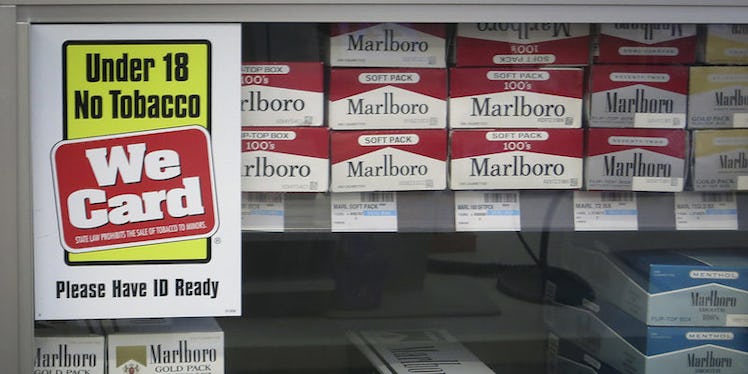
This New California Smoking Law Proves It's Time To Rethink The Drinking Age
Californians now have to be at least 21 to buy tobacco products in the state as of Thursday.
The state raised the age when you can buy cigarettes from 18 to 21. Hawaii is the only other state to have that high an age limit for tobacco, according to ABC.
It's no big secret that tobacco is harmful to your health. Tobacco is also addicting, so when you start, it's hard to stop.
California raised their tobacco limit because of these health problems. Most daily smokers start before they are 19 years old. Increasing the smoking age to 21 is expected to discourage 15 percent of young people from smoking, according to the Institute of Medicine.
Governments across the country have been trying various programs to decrease the number of smokers, including raising taxes on cigarettes, banning smoking from public places and parks and providing services to quit smoking.
California raising their smoking age is part of a larger trend to decrease smokers. It's a good move with the potential to help a lot of young people throughout their lives. It also helps with public health in decreasing the effects of secondhand smoke.
As you probably know, 21 is also the legal age limit for buying alcohol. This is true across the United States, but it doesn't make quite as much sense in terms of health.
The serious health and safety issues from alcohol are due to irresponsible consumption of alcohol.
Arguably, if the age limit for alcohol were lowered from 21 to 18 or 19, young people could more safely learn how to drink.
As it is now, drinking is seen as a taboo thing. If the drinking age were lowered, this image could lessen. Drinking culture could change as it's more integrated into regular society, and therefore not seen as something you must get your hands on and guzzle.
People under 21 learn how to drink in unregulated spaces like frat houses, dorms and, you know, your friend's basement. If the drinking age were lowered, people could learn how to drink openly with parents, who could teach responsible habits and help show that alcohol does not always have to be consumed in massive quantities during a pregame.
Binge drinking is a real problem on college campuses, where there are few ways for universities to be able to successfully prevent underage drinking.
S. Georgia Nugent, former president of Kenyon College, wrote:
By outlawing moderate use of alcohol in appropriate social contexts and with adult oversight, we have driven more drinking underground, where it has taken the very dangerous form of “pre-gaming.” The “under-age” drinker, no longer permitted the occasional beer during a dance party, is now more likely to chug high-octane alcohol in dangerous quantities before heading off to that party. As a result, alcohol use has become more, not less, dangerous.
The drinking age was raised to 21 across the country in 1984. Ronald Reagan's National Minimum Drinking Age Act said that states would lose federal highway funding unless the drinking age was set at 21, so states followed suit.
This was done to lower fatalities from drunk driving, which is a great reason. Fatalities have decreased, but that may have also been due to other factors like increased rules on DUIs and seatbelts.
Lowering fatalities from drunk driving could also be done by improving public transportation and increasing alcohol education. States have varying ages for driving, and similar laws and policies could be put in place for alcohol.
Unlike tobacco, which is a harmful and addictive substance, alcohol does not have to explicitly be a harmful substance with proper education and socialization.
We can see this play out in Europe, where the drinking age is lower and young people often drink with families. The World Health Organization found that Americans drink less alcohol than Europeans, but Americans are more likely to die from alcohol-related causes, the Daily Beast reported.
Some states are actually considering lowering the drinking age, despite the decreased federal highway funding they'll get in return. California, New Hampshire and Minnesota all considered legislation to lower state drinking ages this year, MTV reported.
In New Hampshire's proposal, people could drink wine and beer at 18 and hard liquor at 21 — a good stepping stone to drinking, similar to the tiered driver's license system.
Maybe it's time other states considered taking similar steps.
Citations: ABC, New York Times, The Daily Beast, MTV